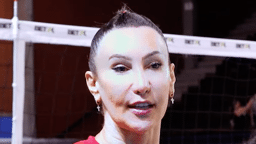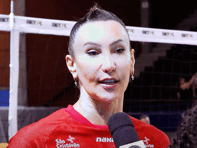(This story was published in 2006).
Brian Paul Fell is a world-class sprinter. He ran track at UCLA and was a two-time national champion: in the 4×400-meter relay and the distance medley, in which he ran the 400-meter leg. He has qualified for and competed in three Olympic trials, most recently the trials for the 2004 Olympics in Athens. As a member of HSI track and field, he has trained with the likes of Maurice Green.
I have known Fell since the summer of 2002; for most of that time, I have been trying to get his permission to write this article. I have trained with him and I have won two gold medals at the Gay Games with him. He and I were even roommates for a year. That entire time, Fell was wary of any press that might draw attention to his sexuality.
Being a gay White sprinter, it’s understandable.
“In track and field, in sprinting, there were no, and there are no, out gay athletes,” Fell says. And in his specialty, the 400-meters, White runners simply haven’t find success; that is until Jeremy Warner exploded onto the seen and won the event at the 2004 Olympics in Athens, something Fell had been hoping he would do.
Training and hoping to compete in the Olympics, Fell has shied away from interviews like this for years. Not so anymore. Soon to be hanging up his sprinting spikes for distance shoes, Fell is increasingly willing to talk about his past, and his future, as a gay athlete.
This isn’t to say Fell hadn’t been completely in the closet. As a freshman and sophomore at UCLA, he dated a male teammate, Brandon Del Campo. Both were deeply closeted at the time, sharing their relationship with only their closest friends. The two lived together Fell’s sophomore year; but their break-up that year caused complications in more than just their living situation.
“I was the one on the team to go to for workouts or anything,” Fell says. “And then, when we broke up, my life turned around. I moved out, and people started questioning my mental state. They didn’t understand what was going on with me. Mr. Strong Brian Fell was now Mr. Crazy, Confused and Depressed, and people thought it was just a typical roommate switcheroo. And I had to explain to them that [Brandon] was my partner.”
Most difficult was telling coach John Smith, considered one of the premiere track coaches in the world, the U.S. Olympic Committee’s national track and field coach of the year in 1999 and the head coach of the 2005 USA National Team.
“I was crying and he just gave me this big hug and he wouldn’t let me go,” Fell remembers. “And he said, ‘it’s alright, nothing changes, you’re still my favorite.’ He said has many gay friends, and he said being gay is nothing different, and all he wanted from me was to refocus and regain myself. And I did.”
In all of his 10 years as a sprinter at UCLA, as a student at the school and then continuing his training on campus after graduation, Fell says he experienced only one moment of homophobia, from then-UCLA-basketball-player Rico Hines, who called him a faggot in the training room several years ago.
Within the team, Fell was well-supported. Straight male teammates would lovingly tease him, asking him if he thought they were hot. And when Fell’s senior season came around, his team voted him captain. For an out White sprinter in a world dominated by straight Black men, that was quite a statement.
When he raced at the Gay Games in Sydney in 2002, Fell was golden. He won five events: the 100-meters, 200-meters, 400-meters, 4×100-meter relay and the 4×400-meter relay.
“What I did in Sydney, I would love to challenge someone else to do,” Fell says. “I would most likely get injured. To go from the 100 to the 400, it’s not a safe bet for any sprinter. I almost got injured in Sydney, and I bet I’d get injured in Chicago if I tried it again. It was so not safe to do that.
Only one man – Tom Burke – has ever won the 100-meter and 400-meter races at the Olympics; and that was in 1896, the first-ever modern Olympic Games, and with a time of 54.2 seconds, almost eight seconds slower than Fell’s top time. And it was only this past weekend that a man won the two events at the NCAA championships, as LSU’s Xavier Carter took the national championships in those races, along with the 4×400 and the 4×100. That put Carter 200 meters short of what Fell did in Sydney.
In Chicago this July, Fell is considering attempting the feat again. He is presently registered for the 100, 400, 4×400 and 4×100, and he may add the 200 to his docket. Winning all four in back-to-back Gay Games would be an incredible accomplishment; but attempting all four could also leave him with a costly injury.
Despite being a track star at the Gay Games in Sydney, Fell shied away from any attention. He was wary of his picture being taken and he wasn’t thrilled to have his name printed on Outsports.com. But by the end of the Games, Fell’s hard outer shell started to melt.
“All those years, I practiced day in and day out how to be ‘normal’ in an athletic setting,” Fell says. “I didn’t have to do that in Sydney, and I loosened up a little bit more as each day went on, seeing men hug each other and two lips touching each other. Every day I saw human compassion.”
While he would love to have Olympic gold around his neck, at 29, he sees his hopes of making the Olympics in the 400-meters extinguished. Fell blames part of that on his competitors’ use of performance-enhancing drugs, something he has always refused to take part in. He says the people who take those drugs form a very secret club, that they’re very smart, and that they know how to not get caught.
“But you can tell by looking at a human body who takes steroids,” Fell says. “You can literally see a woman’s or a man’s body change. I have raced people who were once not as good as me, and then a year later, I could not beat them. I knew my training and diet and vitamin intake were world-class. And not to beat a peer who was once inferior to me and couldn’t pass me in a race and now is beating me, there’s only one solution for that: they’re taking performance-enhancing drugs. At that level, every millisecond counts. And if your competitor is somehow suddenly beating you now, there’s just no way around it.”
Having lived in Los Angeles for his collegiate and post-college careers, Fell has traded in his days of sometimes being recognized on the street for a more anonymous new life in Fort Lauderdale. He has taken up interior redesigns of showrooms and stores and event planning and designing. He has already begun a transition to distance running and triathlons (he placed in the top 25 in the Los Angeles triathlon last year), and he says he’s going to tackle a marathon after the Gay Games in July.
“And I’m currently single,” he says. “You can put that in big letters.”







































